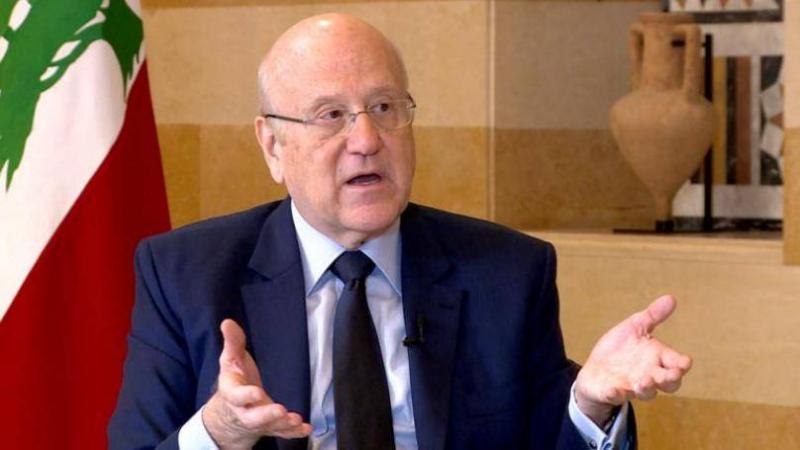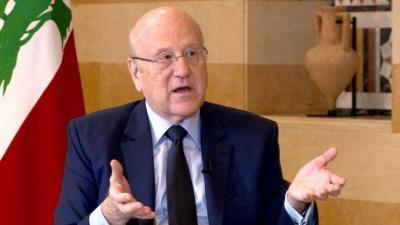Prime Minister Najib Mikati expressed his hope that the person tasked with forming the next government would be from the newly elected parliamentarians. He stated, "There are 27 Sunni figures among those eligible for election, most of whom possess competence, and the most important thing is for the government to be supported by parliament." Regarding whether he would accept to form the new government, Mikati said in a special interview with Al-Hurra conducted by Mona Sleiba: "I am not seeking a mandate; I have carried the ball of fire with everyone's testimony in an effort to rescue. If everyone does not realize the difficulties of the current phase and cooperate, I am not willing to rush into this matter. I do not want to be a prisoner of a stagnant position on this issue; matters are contingent on their timing. If I am certain that the government will be formed quickly and according to appropriate criteria, then I am ready."
In response to a question, he said: "I support the same government, and for me, we are 24 people '24 carats.'" He added, "The current government works as a unified team despite having diverse opinions to enrich the discussion, not to hinder it. In general, the government has fulfilled most of what it committed to, regarding the recovery plan, conducting parliamentary elections, maintaining security, and preserving Lebanese-Arab relations."
Regarding his assessment of the parliamentary elections that took place in the diaspora, he said, "The elections were successfully held despite logistical complications, but we wished that the number of Lebanese voters was larger. It is good that the 16th district was not approved in the electoral law, as this helped maintain the close relationship between Lebanese residents and those in the diaspora."
In response to a question, he stated, "It is impossible to predict voting trends in the diaspora while awaiting the counting. However, based on what we've observed, most of those who registered to vote wish to return to Lebanon." About the upcoming elections on Sunday, he stated, "The preparations have been completed, and the Minister of Interior is taking all the measures to ensure that the voting is done with integrity and transparency."
Regarding the Sunni boycott of the elections, he said, "Sunnis will participate, and there is no boycott of the elections. There is a decision from the Future Movement not to participate, but there will certainly be deputies representing the Sunni community and conveying their concerns."
On the factors that led him to fear that the presidential elections might not occur on time, he said, "It's the required blocks for the quorum that scare me. I have spoken as someone who engages in public affairs and has followed presidential elections in recent years. So far, I do not see how to resolve the known complications, but matters are contingent on the will of the new parliament. It is essential to organize things quickly and to name a new president to form a government rapidly; we will be supportive of him. Matters are connected to the election results."
Regarding Israel's imminent actions to begin oil exploration in the disputed Karish field, he said, "I have requested information and necessary procedures from the Ministers of Foreign Affairs, Public Works, Transport, and National Defense to take appropriate measures to protect Lebanon's rights."
On the claim that there is exaggeration in discussing the positives of the agreement with the IMF, he said, "We are in the midst of a difficult crisis, and there is no alternative to this agreement. Officials from several countries have informed us that once this agreement is signed, grants will be provided to support Lebanon. Through the initial agreement, we have put the solution train on track, but it has not yet started, and we need to continue discussions with the IMF regarding related files, including those concerning depositors' rights. We have not yet concluded with the IMF, which has conditioned four preliminary matters: the budget, banking secrecy, a draft law on transfers, alongside a project related to the banking sector that we hope to refer to parliament after next week’s cabinet session."
In response to a question, he said, "We protect banks because they are an essential part of the country's economic cycle; we do not protect bankers. Lebanon also needs banks and the private sector to restart anew."
Regarding the banking sector's rejection of the government's plan, he pointed out, "There are certain standards set by the IMF regarding the state's ability to fulfill its obligations. Our goal is not to protect or harm banks, knowing that the plan has not been finalized. The IMF has placed a framework for the solution, and nothing is dictated by coercion; if anyone has a better proposal, they should present it."
Mikati reassured depositors with up to $100,000 in banks, stating, "The first $100,000 of every depositor in every bank is guaranteed 100%."
In response to a question about raising customs dollar rates, he said, "All matters related to the dollar will be gradually raised until we can secure financial balance; otherwise, we will be without state resources. The crisis requires gradual steps and accompanying measures to emerge from the crisis."
Regarding discussions about selling Lebanon's gold reserves, he said, "The gold will not be touched at all, and there is a law that prohibits that."
In response to a question about electricity tariffs in the coming phase, Mikati confirmed that the tariff will increase, after which the process of supplying citizens with more electricity hours will begin. The pricing will be less than half the pricing of electricity generators because it is very difficult to maintain the electricity tariff as it is. However, the increase will coincide with an increase in supply hours to reach 16 or 24 hours, depending on the tenders we will conduct.




